Just like their name, the soil requirements of Hens and Chicks are also different from other plants. These lovely-looking succulents can grow in any type of soil. However, some things would need considerations.
In this article we shall learn, what kind of soil do you use for hens and chicks.
Hens and chicks generally prefer well-drained soil with lots of sand and rocks. An ideal mix for hens and chicks would be 1/2 part of sand with 1/4 part of gravel and 1/4 part of vermiculite or perlite, and a handful of compost. The ideal pH level for these plants is between 6.5-7.5.
Most plants need nutritious soil to thrive whereas, Hens and Chicks will grow in any well-drained soil. This plant hates standing over wet soil for a prolonged period, and little soil between rocks is also enough for these plants to grow.
With that said, there are several factors to consider while choosing a soil mix for hens and chicks. Let’s discuss all of them in detail.
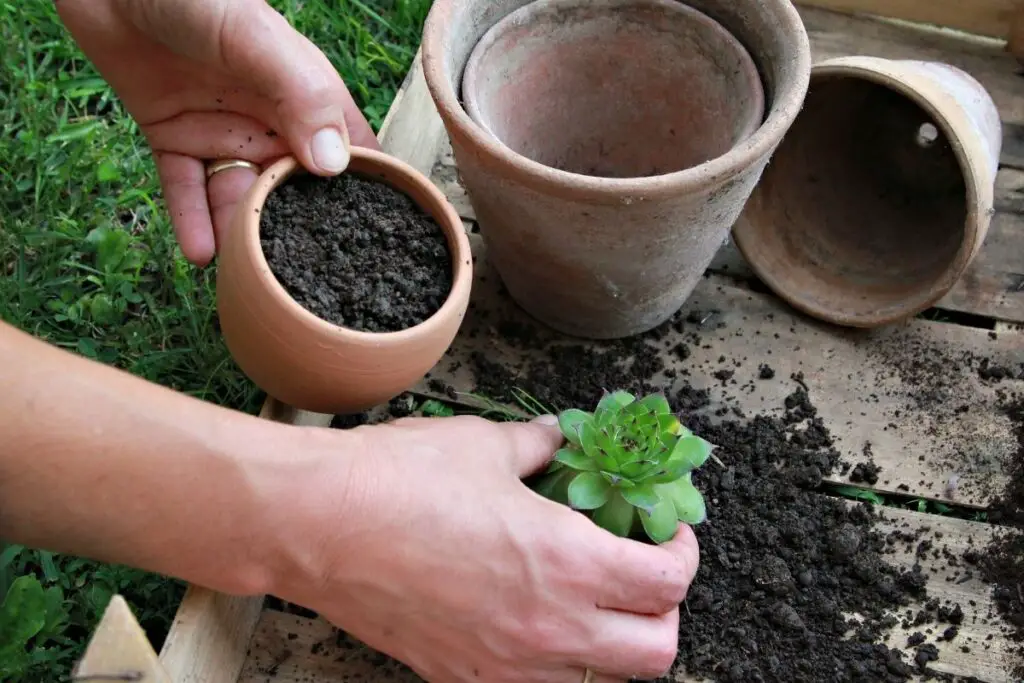
Things to remember while selecting the soil for Hens and Chicks
Many things are needed to comprehend before you start planting the Hens and Chicks. Though growing these plants is easy as they will grow well in any soil, you need to know a few facts before planting them.
The texture of the soil
The soil you select for the Hens and Chicks should be sandy or gritty. You can use clay soil. But as clay soil can hold moisture for a long time, the plant won’t improve much. Hens and Chicks can flower and multiply.
Planting in clay soil will affect their flowering and spreading due to the slow draining of moisture.
They will flower and multiply if planted in part sandy soil. This will improve drainage. Instead of transplanting them, add sand to make the soil bed well-drained and gritty.
These plants are shallow-rooted and can even be grown on cottage roofs.
Soil fertility
The Hens and Chicks do not appreciate fertile and rich soil. They grow fine in infertile soil. This is what makes these plants different from others.
The soil will also not need fertilizer unless they face any severe deficiency of any specific nutrient.
Moisture
Hens and Chicks are the plants that can survive droughts. They will need a kind of soil that will empty water faster and remain dry.
Even though they will tolerate and survive slightly moist soil, they will hate to stay on overly moist soil for extended periods.
This is why you must avoid clay soil. It holds moisture for the long term. However, they will tolerate clay soil, provided you skip watering.
Water after the top 1-2 inches of soil gets dry. But, if you water them without checking the moisture, it might result in overwatering. Use clay soil at your own risk.
Also read: How Much Water Do Hens And Chicks Need? (Underwatering+Overwatering)
Looking for gardening supplies? We have tested 100's of products before recommending them to you guys. Check out our best pick below:
| Image | Gardening Supplies | Best Price? |
|---|---|---|
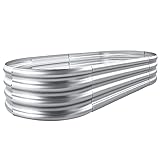 Top
Top Top
Top | Raised Garden Bed Kit | Check On Amazon |
 | XLUX Soil Moisture Meter, Plant Water Monitor, Soil Hygrometer Sensor for Gardening, Farming, Indoor and Outdoor Plants, No Batteries Required | No Results |
 Top
Top Top
Top | 82 Pcs Garden Tools Set and Extra Succulent Tools Set | Check On Amazon |
 | Joeys Garden Expandable Garden Hose with 8 Function Hose Nozzle, Lightweight Anti-Kink Flexible Garden Hoses, Extra Strength Fabric with Double Latex Core, (50 FT, Black) | No Results |
 Top
Top Top
Top | Dual Chamber Compost Tumbler | Check On Amazon |
 Top
Top Top
Top | Sunnyglade Plant Stakes | Check On Amazon |
 Top
Top Top
Top | Organic Cold Pressed Neem Seed Oil | Check On Amazon |
 Top
Top Top
Top | Mighty Mint Gallon :-Insect and Pest Control Peppermint Oil | Check On Amazon |
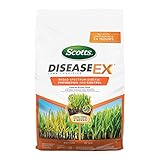 Top
Top Top
Top | Scotts DiseaseEx Lawn Fungicide | Check On Amazon |
 Top
Top Top
Top | Jacks Classic 20-20-20 All Purpose Fertilizer | Check On Amazon |
 Top
Top Top
Top | 30,000 Seeds Pollinator Attracting Wildflower Mixture | Check On Amazon |
 Top
Top Top
Top | Survival Vegetable Seeds Garden Kit-Over 16,000 Seeds | Check On Amazon |
Soil pH level
As I mentioned before, they will grow in poor but well-drained soil.
Mostly, dry and sandy soils are of their type. These kinds of soil hold pH levels of 6.5-7.0 or higher.
Even if the pH gets lower than that, you don’t need to get stressed. Wait and correct it unless you find any signs like deformed leaves, stunted or poor growth.
Importance of choosing the right kind of soil
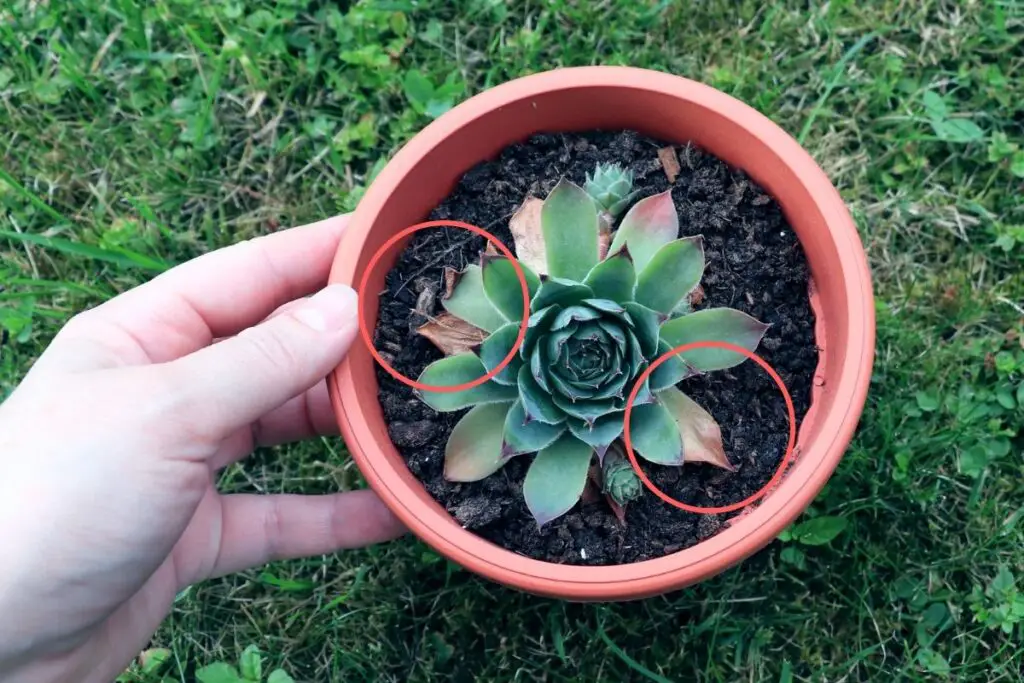
Using the right kind of soil is very important for Hens and Chicks. Even though they can grow in poor soil, they will not grow well in saturated or rich soil.
Getting suitable soil in their native land is natural. But growing them in your garden will need some gathering and effort, not too much, though.
The right kind of soil will encourage:
- Healthy growth of the plant
- Sound drainage
- Free from fungal diseases
- Profound flowering
Signs of using the wrong type of soil
- Saturated soil and mushy leaves because of poor drainage
- Distorted leaves due to the wrong pH level
- Plant suffering from lack of moisture
- Poor development
- Stunted growth
To avoid the above conditions, you need to use the best soil type for growing healthy Hens and Chicks.
What is the best kind of soil for Hens and Chicks?
Purely clay soil or purely sandy soil is not most suitable for Hens and Chicks.
Indeed they enjoy well-drained and dry soil, but they will also need some moisture to remain hydrated. Every plant needs to be hydrated to live longer.
A mixture of potting soil and sandy soil will be the best kind of soil for the Hens and Chicks. Some amount of clay in garden soil will retain moisture.
The sandy soil will improve drainage and encourage pleased root growth. However, the plants too can hold moisture in them. That is why they need watering only once a week.
Mix potting soil and sand in the ration 1:1. It is best for more or less all the types of Hens and Chicks. During the rainy season, the leaves don’t get rot by overwatering.
The sand present in the soil bed helps inadequate drainage. It doesn’t allow the water to remain motionless in the bed.
Too much nutritious or fertile soil is not necessary for Hens and Chicks. They can grow in badly infertile soil. These plants deliver a lot of auxins, supporting them to reproduce, and they don’t need any additional nutrition.
But if you want, you can feed them with a few amounts of mineral fertilizers. Make sure not to over-feed them.
Adding garden soil and compost may be very good to hear but avoid doing this for Hens and Chicks. There are chances of decaying in compost, and succulents won’t like it.
Most species of Hens and Chicks prefer pH ranging from 6.6 to 7.5.
Neutral soil is the best soil for these plants. However, some other varieties of Hens and Chicks like acidic soil, for example, Sempervivum Ruthenicum and subspecies of Sempervivum arachnoideum.
When planted in alkaline soil, the Hens and Chicks grow very pleasingly. The plant has bright colors and beautiful polar colors in the leaves. When the pH level exceeds its level, you have to fix it.
Space Hens and Chicks need in the soil
There is no specific measurement for the quantity of soil. But the amount of space and depth the roots take to grow will tell you the correct soil quantity.
The small varieties of Hens and Chicks will have roots having a depth of about 4 inches or more. The large varieties will take up to 8 inches.
The more space they get, the more healthily the roots will grow. The roots hold a lot of moisture. This moisture will let the plant grow profoundly. Keep the depth of the roots in mind and then attempt to plant them.
If you are planting Hens and Chicks in the ground, the ground area must be the same size as the plant’s diameter. You can also choose a bit more. This will give them more space to outstretch the roots.
Other types of soil where Hens and Chicks will grow best
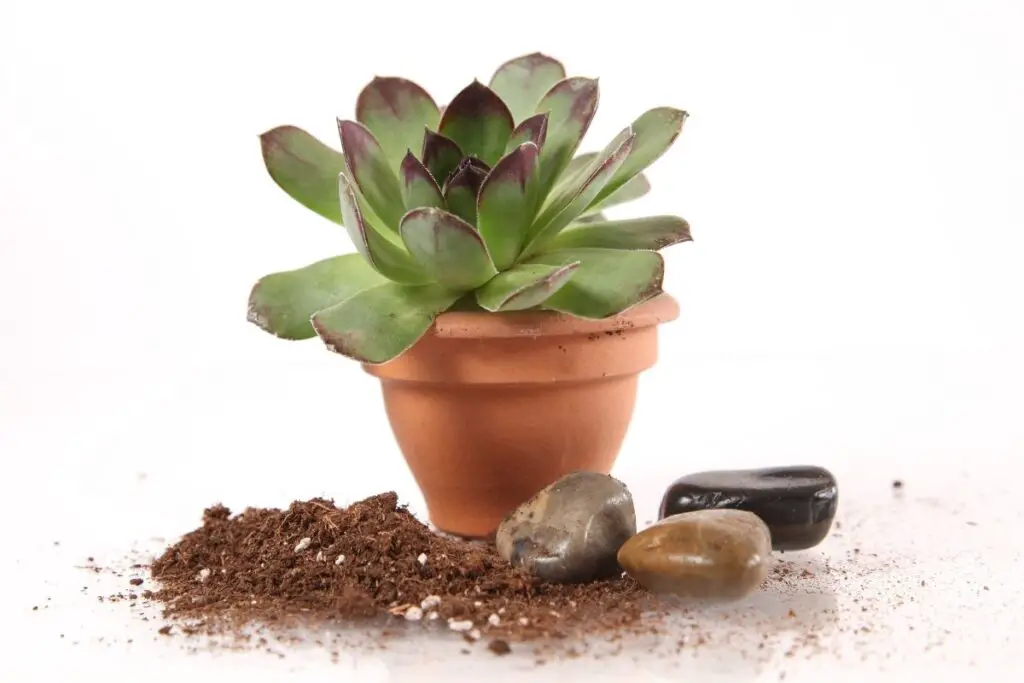
A mixture of garden soil and sandy soil is not the only best soil type for growing Hens and Chicks. There are many other kinds where these plants can grow and thrive reasonably.
You can create a gravel bed and plant Hens and Chicks on them. In the beginning, let them have filtered sun. This will make sure that the young plant doesn’t suffer any sunburn. This will also promote better root development.
Once the plant gets a little bigger, remove the shelter and let them have full sun.
Some varieties will grow well in partial shade, so no need to remove shelter for them. Water the plant regularly, especially during summers, while growing in gravel.
When they grow big, the plant will be bright and prominent. The border in between the colors will be visible. The plant will look very beautiful and healthy than those growing in soil.
Another ideal soil type is rocky soil. Though the roots struggle to develop, the plant will grow healthy. This type of soil will save your plant from overwatering issues.
During the rainy season, they won’t have the trouble of prolonged damp conditions.
This might be strange to hear, but Hens and Chicks will even grow in stones. Yes, that’s right, stones. Growing in stones is their natural environment.
If you have rocky areas around your garden, drill a hole in the stone, add some soil and plant the Hens and Chicks.
Planting them in such a way in stones tells us that these succulents will grow in much less soil.
This feature makes them very distinct from others. The only problem that occurs is a lack of moisture. That is why, just like in gravel planting, the plants will need water more often in stones too.
Some growers recommend growing Hens and Chicks in perlite for good growth. Perlite is an excellent porous ingredient that improves drainage. It will also promote root growth.
But, if your plant can thrive in a mixture of garden and sandy soil, you will not need perlite. Moreover, perlite is very costly.
Best soil for hens and chicks
There are various mixes that you can try for your hens and chicks. If you are growing them in a garden, then adding a lot of sand into the soil bed helps them grow well.
In the pot and raised beds, they need a different soil mix. Although you can create your custom soil mix as well, these are my best recommendation for you.
Recipe 1:
- 25% Potting soil
- 50% Sand
- 15% Perlite/Vermiculite
- 10% Compost/Worm casting
Recipe 2:
- 50% Succulent and cactus mix
- 25% Sand
- 15% Perlite/Vermiculite
- 10% Compost/Worm Casting
Recipe 3:
- 50% Garden soil/Potting soil
- 50% Sand
- A handful of Compost
All of these recipes are formulated by keeping in mind the drainage and nutrient needs of the plant.
You can replace particular components in this mix as per the availability of resources.
However, keep in mind that you don’t want to use certain ingredients which can wreak havoc. We will discuss this next.
Types of soil ingredients you should avoid
Two types of soil you must avoid while planting Hens and Chicks – pure clay soil and peat.
You should avoid pure clay because it can hold moisture for a long time. Clay soil is only used while mixing with sandy soil to improve drainage.
The water dwells in the soil and drains very poorly when you use simply clay soil for the Hens and Chicks. However, clay soil won’t create many problems if you follow an ideal watering regime and keep the moisture level in check.
Primarily, the risks are more during the rainy seasons. The water gets accumulated in the soil and causes overwatering, ending with root rot. It becomes tough to revive the plant back. This situation is not mandatory, though are there are high risks of this situation.
Sometimes, a beginner might make the mistake of overwatering. If you are a newbie, it is always better to avoid pure clay soil. Always mix it with sandy soil and then use it for the Hens and Chicks.
Another kind of wrong soil is peat. Peat tends to hold moisture for a long time during rains and dry out faster during hot and dry summers.
There can be high chances of root rot in rains and a lack of moisture in dry summers. This will not allow the plant to grow and remain in suitable health.
Moreover, while growing in peat, the Hens and Chicks develop a shallow root system that does not provide adequate nutrition and moisture to the plant. This overall abnormality affects the plant’s growth and development very poorly.
Additionally, peat has a high acidity level which might not be much fit for the plant.
Can you plant Hens and Chicks in pure sand?
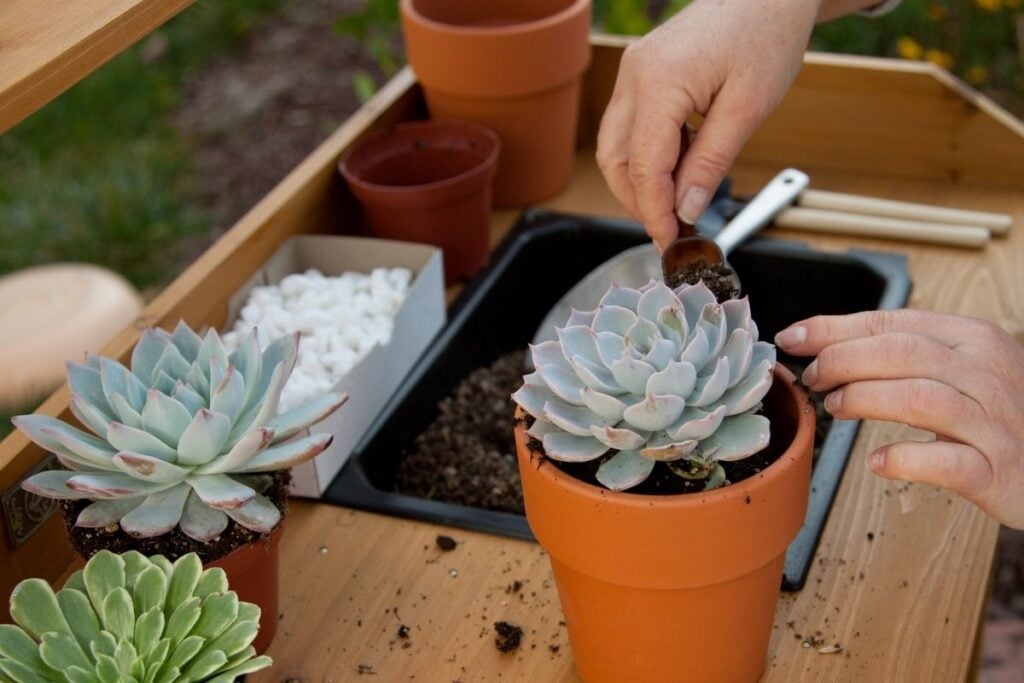
Like the plant will suffer in pure clay soil, it will also suffer if planted in complete sand. Sand doesn’t retain moisture, especially during the summers. So the plant will suffer from dehydration.
It is always better to use 50% of potting soil or clay soil and 50% of sand together to make an ideal soil bed for Hens and Chicks.
Final words
Most Hens and Chicks can grow very satisfactorily in well-drained and poorly nutritious soil. You can readily grow them by adding garden and clay soil.
There are many other options of growing medium too for having a perfect Sempervivum – gravel, rocky soil, and even stones. You can try any of them.
Growing in stones or gravel doesn’t mean they will not need soil. The roots will need to get soil because the roots and plants get water from the soil. Some soil is necessary.
Make sure to water the plant depending on the soil type. Planting in gravel beds and stones will need daily watering in dry weather. If you are using garden soil, make sure it drains water well. Water carefully and skip during rains.
You don’t need to bother about the pH level because garden soil, sandy soil, or rocky soil have the pH level favored by the Hens and Chicks. The pH of these soils is nearly neutral, i.e., 7.0. So, these plants will efficiently grow in them.
Reference: Wikipedia, Iowa State University of Science and Technology, The University of Arkansas Division of Agriculture, NSDU, The Ohio State University, Missouri Botanical Garden.
